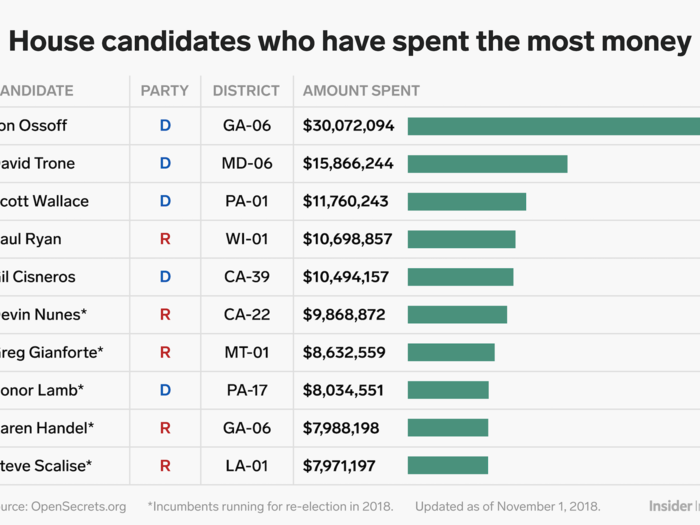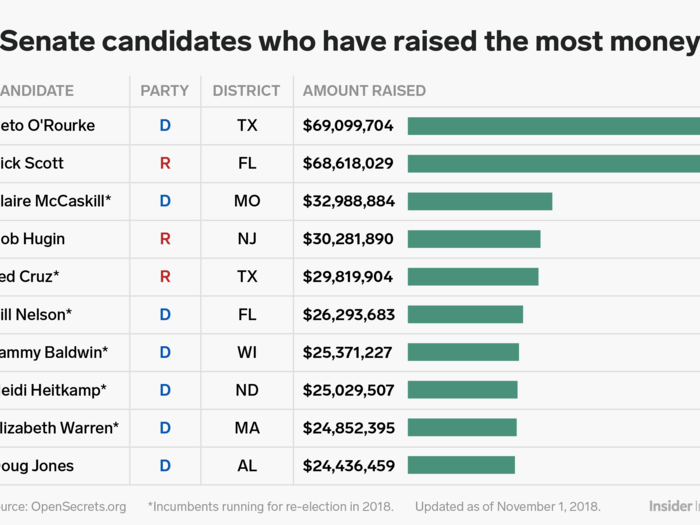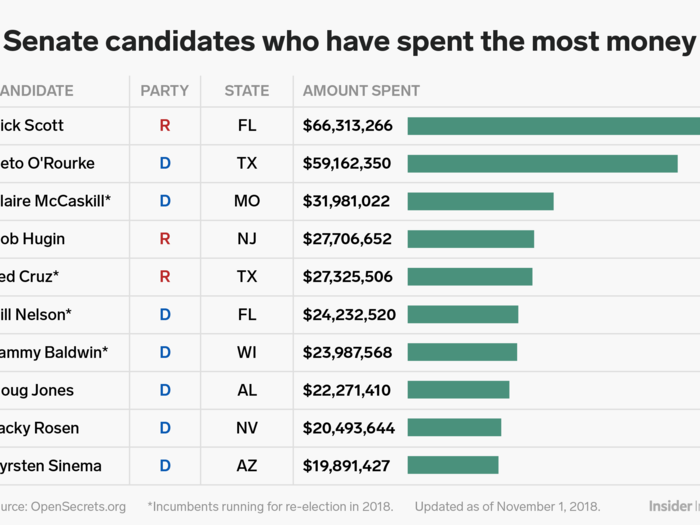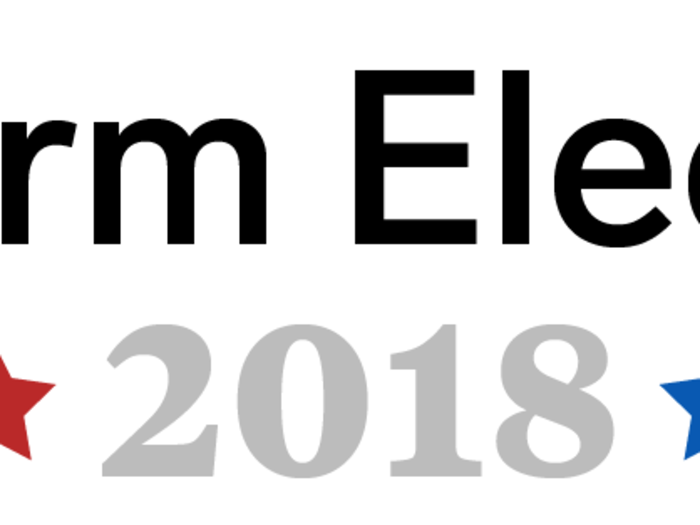- Home
- slideshows
- miscellaneous
- The 2018 midterms will be the most expensive in history - here are the candidates who have raised and spent the most money since Trump's election
The 2018 midterms will be the most expensive in history - here are the candidates who have raised and spent the most money since Trump's election
The House candidates who have raised the most money:

The House candidates who have spent the most money:

Since federal campaign finance law requires candidates to spend 100% of the money they raise for a given election on that race, the House candidates who have raised the most money also tend to be the ones who spend the most.
One person on the list of highest spenders but not fundraisers is Rep. Paul Ryan, the powerful speaker of the House of Representatives, who is retiring this year. Ryan is giving away approximately $10.7 million of the money raised through his campaign committee.
He's given about $7 million to the National Republican Campaign Committee, presumably to help other Republican candidates, and another $3 million to assorted Republican campaign consulting firms.
Meanwhile, David Trone in Maryland's 6th district (which is considered solidly blue) and Scott Wallace in Pennsylvania's newly-redistricted 1st congressional district, rated a toss-up by FiveThirtyEight, are spending $15 and $11 million respectively, largely self-financing their bids.
The Senate candidates who have raised the most amount of money:

Rep. Beto O'Rourke broke an all-time quarterly fundraising record when he raked in a staggering $38 million in the 3rd quarter of 2018 alone. He's running to defeat Sen. Ted Cruz in Texas, and his rapid rise to national prominence and fundraising prowess have made him a star in the Democratic party.
Some of the highest fundraisers are also the most prominent figures in their respective parties, like Cruz and Democratic Sens. Elizabeth Warren and Tammy Baldwin.
As in the House, wealthy Senate candidates like Rick Scott in Florida, who is challenging Democratic Sen. Bill Nelson, and pharmaceutical executive Bob Hugin, the Republican candidate in New Jersey challenging embattled Democrat Bob Menendez, are largely self-funding their campaigns.
Scott, whose net worth is estimated around $233 million, has spent about $51 million on his own campaign, making up 75% of his total fundraising. Similarly, Hugin has poured in $27 million in his bid against Menendez.
On the other hand, O'Rourke, who is not taking corporate PAC money, receives half his donations, or about $30 million, from small donors (those who spend $200 or less) and large donors.
Democratic Sens. Elizabeth Warren and Heidi Heitkamp also eschew corporate PAC money as much as they can, and similarly rely on individual donations.
Heitkamp, who represents North Dakota, recieved an outpouring of $12 million individual donations from across the country in the 2 weeks after she made the politically perilous decision to vote no on the confirmation of Justice Brett Kavanaugh, but she's still projected to lose her seat to Rep. Kevin Cramer.
The Senate candidates who have spent the most money:

Rick Scott and Beto O'Rourke lead the pack by a wide margin in campaign spending, with $66 and $59 million respectively in campaign this cycle. While Scott is pouring money in TV ads across Florida, O'Rourke is buying up not just TV, but also Facebook and Twitter ads in bulk.
The next-highest spender, Sen. Claire McCaskill, spent just about half as much as O'Rourke, with $31.9 in expenditures so far. Other high-spenders include candidates running in close races, such Sen. Bill Nelson in Florida, Scott's opponent, Rep. Jacky Rosen in Nevada, and Doug Jones, who narrowly beat Roy Moore in a special election for an Alabama Senate seat in 2017.
The dominance of ultra-wealthy, self-financed candidates among the highest-spending House and Senate candidates may give off the illusion that extravagantly rich candidates can effectively "buy" elections, but researchers have actually found otherwise.
Research from political scientist Adam Brown of Brigham Young-University concluded that candidates being able to spend exorbitant amounts of money with their own personal wealth has a relatively weak effect on their vote share compared to external donations.
He instead found the ability to fundraise large amounts from outside donors is a much better predictor of electoral success, arguing that candidates attracting lots of donations signals their attractiveness as a candidate to voters.
And even though Brown's work demonstrates the importance of outside fundraising, it doesn't determine the result of an election.
Jon Ossoff, the highest fundraiser and spender among House candidates this cycle, lost to Karen Handel by 4 points points in the Georgia special election, despite out raising her by a stunning $23 million, most of which came from small donors.
And in Pennsylvania's former 18th district, Democrat Conor Lamb won by a just a few hundred votes against Rick Saccone in the March 2018 special election, despite $11 million being spent to support Saccone (much of which came from outside groups) compared to Lamb's $4 million in spending.
Read more of Business Insider's 2018 Midterm Election coverage:

- All the dates, deadlines, and rules you need to know before voting in the 2018 midterm elections
- SENATE BATTLEGROUND MAP: The race for control of the Senate is as tight as it can be
- These 25 congressional races to watch are the some of the most competitive in the 2018 midterm elections
- Here is the last day you can register to vote in every state
- Here are the deadlines in every state to vote absentee in the 2018 midterm elections
- You can take time off work to vote in 30 US states — but you're out of luck in the rest
- 25 states allow some voters to submit their ballots electronically — here’s how that works
- The evolution of American voting rights in 242 years shows how far we've come–and how far we have to go
Popular Right Now
Popular Keywords
Advertisement